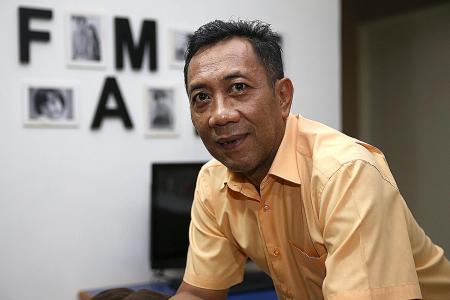Helping kids not follow in their jailed parents' footsteps
Kids with criminal parents are 2.4 times more likely to exhibit unlawful behaviour and the Govt is concerned
When Mr Mohd Hamzah Omar was jailed for drug offences in 2011, his wife became the breadwinner.
With no parental figure at home in the day, their then 10-year-old son's studies started deteriorating.
"I was quite worried because he was already old enough to understand what had happened," said Mr Hamzah, 51, who was a father of four then.
He fretted because he was acutely aware of the problem of inter-generational offending.
He had seen how the incarceration of a parent tore families apart and was worried the same would happen to his son during his 40 months in jail.
"Thankfully, everything turned out okay. Maybe it is because we nurtured good values in our children.
"We would always reason things out, but I never told my children, 'If you do this, you are going to suffer like me'," Mr Hamzah told The New Paper.
In Singapore, four in 10 of the juvenile offenders in the Singapore Boys' and Girls' Homes have a family member who has been jailed before.
A 2012 study led by criminal justice researcher Sytske Besemer found that children with criminal parents are 2.4 times more likely to exhibit criminal behaviour than those without.
Even after accounting for factors such as socio-economic status, family size, education and child abuse, children of criminal parents were still 1.8 times more likely to offend.
While local data on the vicious circle of offending is scant, the authorities acknowledged the problem.
At the Budget debate last year, Parliamentary Secretary for Home Affairs Amrin Amin told the House that curbing inter-generational offending is an area the ministry is concerned about, and it is working with other agencies to "better understand and tackle" the issue.
Elaborating on his point to TNP, Mr Amrin said: "Some research has shown that children are adversely affected by parental incarceration.
"Children of offenders with a lack of parental care may become insecure, struggle with their self-identity, and end up mixing with the wrong company. This increases their risk of getting into crime."
Adding that the ministry recognises the importance of early intervention for such at-risk children, Mr Amrin outlined existing initiatives that "help create a stable environment for the children of offenders, build their self-confidence and ensure they remain actively involved in school to reduce the negative effect of parental incarceration".
INITIATIVES
These include the Yellow Ribbon Fund's Yellow Brick Road programme, which provides financial and other support to inmates' families such as employment assistance and tuition and enrichment workshops for affected children.
The Industrial and Services Co-operative Society (Iscos) Fairy Godparent Programme provides children of ex-offenders from low-income families the opportunity to complete their education through bursaries.
"The community's involvement is vital to ensure that there is continued support for the families of inmates, which will help reduce the risk of inter-generational offending," said Mr Amin.
Such intervention is important because children are often the "silent victims" when one or both parents are in prison, said Ms Lin Mingjie, a senior social worker at the Singapore After-Care Association (Saca).
Saca runs the Initiative for Incarcerated Mothers and Affected Children , which helps refer help to affected families.
"For some children, the incarceration comes about unexpectedly; they experience the pain of separation, it leaves them in shock, feeling helpless and lost.
"Having to adjust to new caregiving arrangements may fuel anxiety and stress; the children may face escalating difficulties and struggles due to their inability to cope emotionally," she added.
Support for the children is therefore crucial to help them understand and adapt to the changing circumstances.
Said Ms Lin: "Without the necessary and appropriate care and support for the family, caregivers may miss out on distress signals from the children or be unsure of how to better help the children cope with the incarceration of their parents."
Iscos programme and services manager Muhd Ali said children with no stability or support at home may look elsewhere for emotional support.
He recalled a father-son pair who were incarcerated for drug offences.
The father was in and out of prison for drug offences. Subsequently, his son was jailed for similar offences.
Said Mr Ali: "There was no proper guidance for the son because his father was in and out of prison. There was no stability in the family, and due to bad influence, the son followed in his father's footsteps.
"The key (to curbing inter-generational offending) still lies in the family."
Mr Hamzah's wife, who wanted to be known only as Siti, would know.
After her husband was imprisoned in 2011, the 43-year-old told herself to work hard so that she could continue to provide for their children.
Madam Siti also made sure to continue doing what her husband would do for the young ones.
"They still got their two sets of new clothes for Hari Raya.
"(And another thing was) I tried to cut letters out of cheese slices like how my husband would, but it got too difficult so I cut shapes instead," she said with a laugh.
"I didn't want them to feel that they were suffering and their father was a bad man for leaving them. If it meant spending less on myself so that the children could continue to have what they were used to, let us do it for them," she added.
Having a capable helper to make sure the children did their homework lightened her load too.
"It was not easy. There were feelings of loss and anger. I didn't know where to start, how to move on...
"I told myself I had to be disciplined and not let the situation affect my work so that there was job security.
"I cleared all the debts my husband had left behind, and I made sure I kept good relations with his family so he could come back home with no worries. I wanted him to start on a clean slate," said Madam Siti.
Mr Hamzah's siblings would pop by and check on her and the children - something Madam Siti was grateful for.
But while resources to help curb inter-generational offending are ample, stigma remains a problem, said Iscos' Mr Ali.
"It is like a buffet. The food is laid out, but it is up to them to come forward. But some families do not want to be labelled or be associated with a co-op for ex-offenders...
"If the public becomes more receptive (to ex-offenders), the families will find it easier to seek help," he said.
For Mr Hamzah, having a family that accepted his past helped him start afresh when he was released from prison in 2014.
A few years on, he has worked his way up to become a senior supervisor in a cleaning company.
At home, he has his hands full with three teenagers, an eight-year-old and a three-year- old.
"Looking back, my incarceration was a blessing in disguise. My wife and I both changed for the better. I was lucky, my wife has sacrificed so much for me.
"Now, it is my turn. I didn't know responsibility could be so rewarding, so sweet," he said.
Get The New Paper on your phone with the free TNP app. Download from the Apple App Store or Google Play Store now



